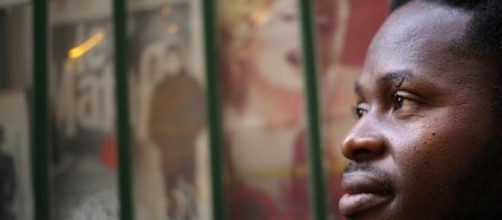From humble beginnings in rural Sierra Leone as a "boy soldier" to becoming a best-selling author and then UNICEF ambassador for children affected by war as an adult, Ishmael Beah has set himself a mission: to transform his experience into an antidote against war. In his latest work, Radiance of Tomorrow, a Novel, he confronts his traumatic past with a gentle lyricism that belies the violence he once knew.
Ishmael Beah picks his words stealthily. The former soldier seems aware of the booby traps they can be. So, he juggles passion and cold judgment with a balance born of routine as he describes his experiences as a child soldier.
The audience at Paris's Maison de la Poésie on blustery afternoon is seamlessly swept into his tale of purgatory and redemption in Sierra Leone's steamy southern heartland. It is part of the 33-year-old's experience in the midst of the country's murderous civil war and the death-strewn life he left behind him, which he brilliantly recounts in his 2007 bestseller A Long Way Gone: Memoirs of a Boy Soldier. Its universality was such it was translated into over 40 languages and Time Magazine ranked it at number 3 in the Top 10 Nonfiction books of 2007.
Twenty years have passed since Beah's life first descended into a nightmare that few survived unscathed. Beah is not even sure he has: he openly admits to his open wound, a work-in-progress that will take the rest of his life to heal.
Part of his therapy, he confides after the show, is to impose long breaks between the times he shares his story in public. As a result, on or offstage, you sense an emotion that, if mastered, is never contrived.
"When A Long Way Gone came out, I spoke about it for months on end, and so I wasn't feeling good, both mentally and physically," he calmly explains to Blasting News after having gone through the process in front of a small and mixed audience in September.
"But I also realized that whatever I do for the rest of my life, my war experiences defined me. Even if I write 20 books, people will always go back to that first one. It's like Elie Wiesel and his book Night." He laughs. "Sixty years down the line, at 90, I'll come in on a cane and be told 'So, you're a child soldier!' At 90!
I'm a hostage of success, for better or worse. But I try to be there and look at the positive aspects of it all."
Self-deprecating humour oozes from the persona. It undoubtedly helped Beah survive the armed conflict of which he was part. It also buoyed him in a rehabilitation process that began in 1996 and that, he says, was even tougher than the fighting itself.
The humour might not seep into his new book, however. Radiance of Tomorrow looks at post-conflict Sierra Leone after the media circus left the traumatized nation alone to lick its wounds. In a conversation with its FSG Books editor Sarah Crichton, recently posted on the publisher's website, Beah says his novel centres on personalities who return to help rebuild in the midst of a shattered landscape.
"These times are really the most important times," he tells Crichton, "because what happens during this post-conflict period can determine if the country goes back into conflict or not."
Beah is the first to admit the years of conflict gutted Sierra Leone. "The traditional ways of living were tested, and in some cases failed," he pursues. "A lot of people no longer know how to carry on their lives anymore. The country's very strange, based on what I saw as a child growing up there. Many people had become accustomed to a sheltered way of thinking about their lives, and they have to change that. So Sierra Leone is now trying to find its identity. And no one knows exactly what that is. I'm writing about these kinds of things, to shed light on what's going on there."
Read the rest of the article in part 2

